Why content marketing is important for B2B - 2023 Statistics
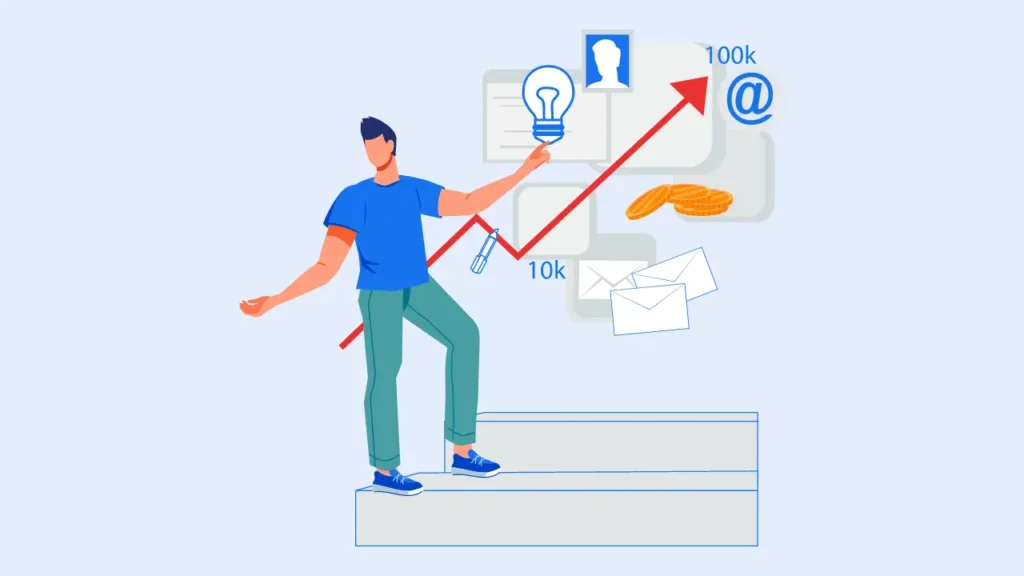
The B2B e-commerce market is projected to reach a staggering $33,317.37 billion by 2030. This figure illuminates the vast potential of the market but also underscores the challenge of differentiation.
Amidst such a vast and diverse marketplace, how can your business carve out a niche that speaks to your unique offerings and values?
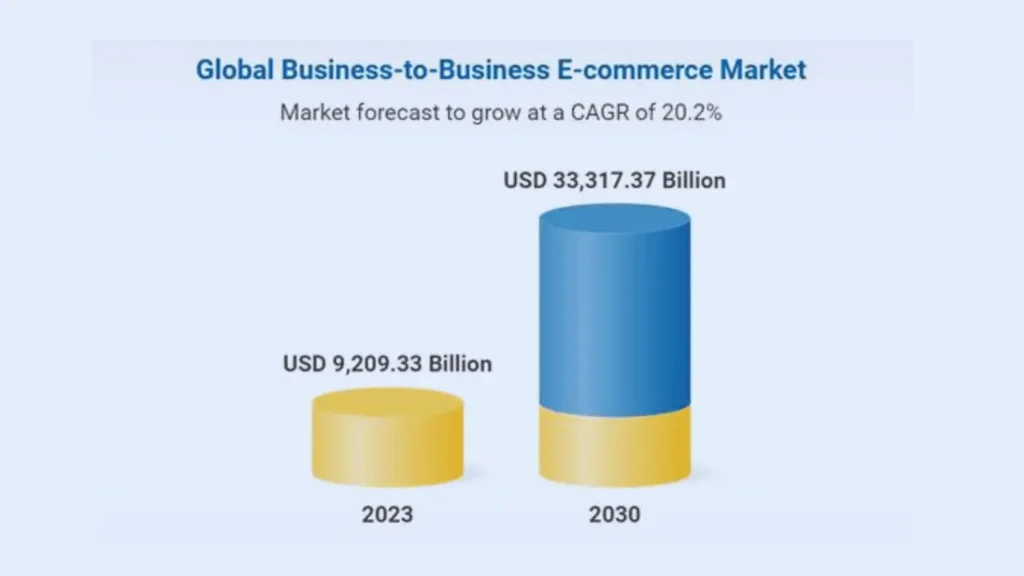
How can you ensure that your message cuts through the noise?
Here’s where B2B content marketing steps in.
Content marketing allows businesses to showcase their unique strengths, thought leadership, and industry expertise. It provides an opportunity to connect with your audience on a deeper level, addressing their needs, concerns, and aspirations with tailored, value-rich content.
In this blog, I will cover whether content marketing is really important for B2B based on the 2023 statistics & market trends
What is the primary objective of B2B content marketing?
The primary objective of B2B (Business-to-Business) content marketing is to create and distribute valuable, relevant, and consistent content to attract and engage a clearly defined audience of potential business clients or partners.
The ultimate goal is to drive profitable customer action, such as generating leads, building brand awareness, establishing trust and credibility, and nurturing long-term relationships with other businesses.
What makes b2b content successful?
B2B content becomes successful when it:
- Targets a specific audience: Clearly defining the target audience helps create content that resonates with their needs, preferences, and pain points.
- Provides value and relevance: B2B content should address the challenges and opportunities faced by the target audience, offering actionable insights, solutions, or industry knowledge that helps them improve their businesses.
- Is consistent and high-quality: Consistently producing high-quality content helps establish a brand as a reliable source of information, which can lead to increased trust and credibility.
- Utilizes various formats: Different content formats such as blog posts, whitepapers, webinars, case studies, videos, and infographics cater to diverse audience preferences and reinforce the message.
- Is well-optimized: Effective B2B content should be optimized for search engines to improve its visibility and reach, making it easier for the target audience to discover.
- Has clear calls-to-action (CTAs): Encouraging the audience to take the desired action, such as signing up for a newsletter, downloading a whitepaper, or contacting sales, helps generate leads and conversions.
- Engages and nurtures relationships: B2B content marketing should foster engagement and interaction with the audience, leading to meaningful connections, long-term relationships, and ultimately, increased customer loyalty and revenue.
5 reasons why content marketing is important for B2B in 2023
- Differentiate from competitors
- Build brand awareness and credibility
- Provide value and address pain points
- Generate leads
- Establishes expertise
Differentiate from competitors
In the ever-evolving landscape of B2B marketing, your attention to strategic differentiation has never been more critical.
Research shows that 54% of sales agents have confessed that reaching out to prospects now is a more challenging task than it was just five years ago. This sentiment underscores an undeniable shift in the business climate; it’s a bustling, noisy marketplace out there, and standing out from the crowd is no small feat.
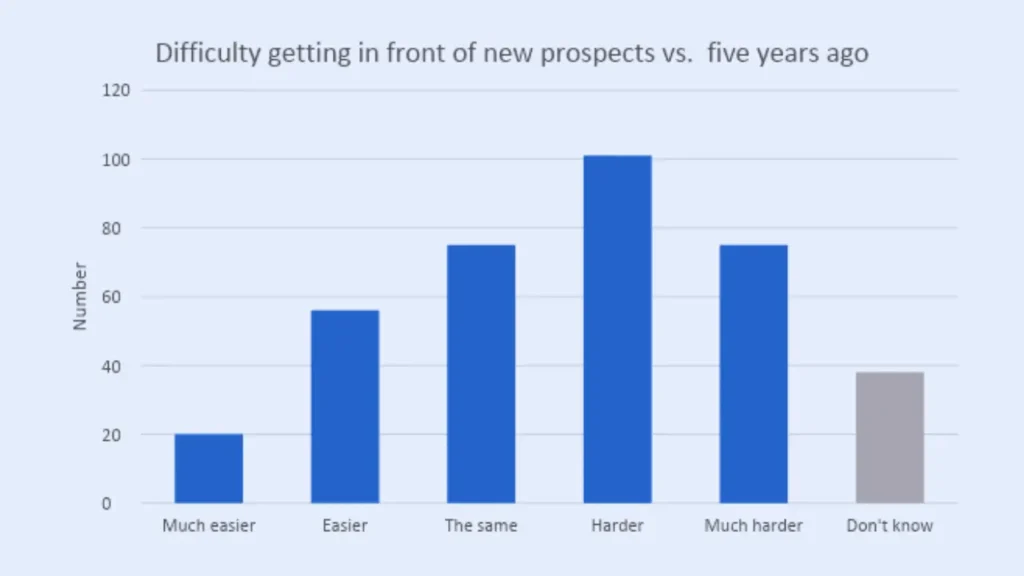
Competition has escalated, and the traditional methods of engagement are no longer yielding the desired outcomes.
Hence, the need for a unique approach, a distinctive strategy that sets your business apart, is paramount.
In 2022, 66% of B2B marketers worldwide were planning to increase their B2B content marketing spending.
This statistic not only highlights the growing recognition of content marketing’s value but also suggests its effectiveness as a means of differentiation.
But remember, successful differentiation doesn’t merely come from outspending your competitors in content marketing. It’s about understanding your audience, developing a unique value proposition, and delivering it through engaging, relevant, and valuable content.
As the market evolves and competition intensifies, I encourage you to consider how your business can leverage B2B content marketing as a tool for differentiation.
In a world where reaching prospects is becoming increasingly challenging, the key to standing out could very well be in the stories you tell and the value you deliver through your content.
Build brand awareness & credibility
As a business professional, you understand the critical role brand awareness and credibility play in your success.
52% of buyers report being more inclined to purchase from vendors after engaging with their content. This statistic reveals the profound impact content can have on your brand’s image and credibility.
By crafting high-quality, informative content that addresses your audience’s needs, you not only demonstrate your expertise but also create a sense of trust and reliability that encourages buyers to choose your business over others.
Social media is another essential aspect of brand building. An impressive 86% of B2B marketers leverage LinkedIn to drive sales, underscoring the platform’s role in raising brand awareness.
The rise of video content is yet another factor to consider. Videos accounted for 82% of online traffic in 2022, suggesting that this medium is indispensable when it comes to raising brand awareness.
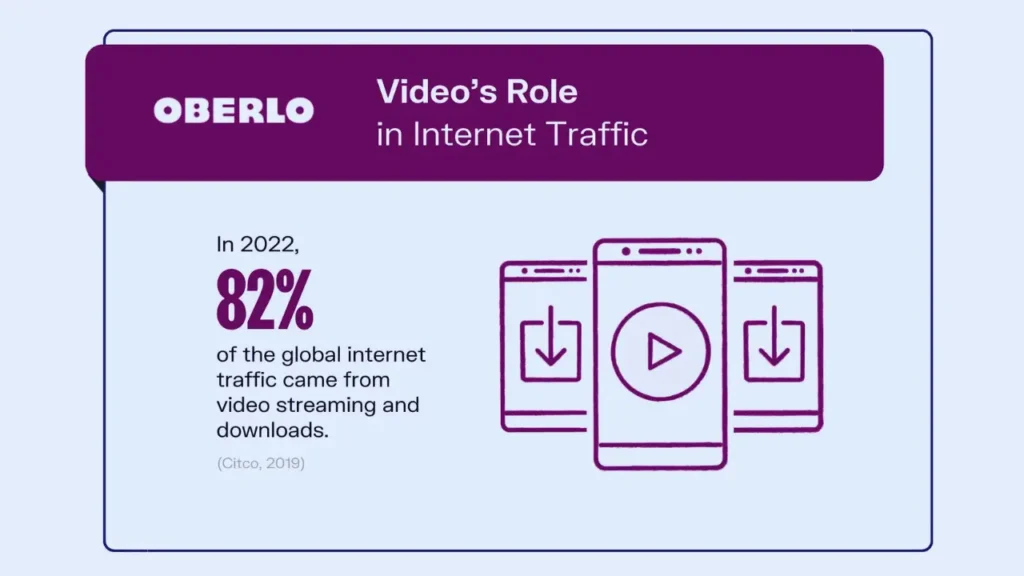
By incorporating engaging video content into your marketing mix, you can capture your audience’s attention, convey complex ideas more effectively, and leave a lasting impression that bolsters your brand’s reputation.
With 84% of B2B executives leveraging social media for their purchase decisions, it underscores the significance of having a strong presence on these platforms. Incorporating AI social media marketing tools can assist in establishing a robust social media presence, which, in turn, can enhance brand awareness and credibility.
Provide value & address pain point
As you explore the world of B2B content marketing, it’s crucial to understand the significant role that providing value and addressing pain points play in influencing the decision-making process of your target audience.
67% of B2B buyers find product specifications and functionality useful. This demonstrates that your audience is actively seeking information that helps them understand the real-world value of your products or services.
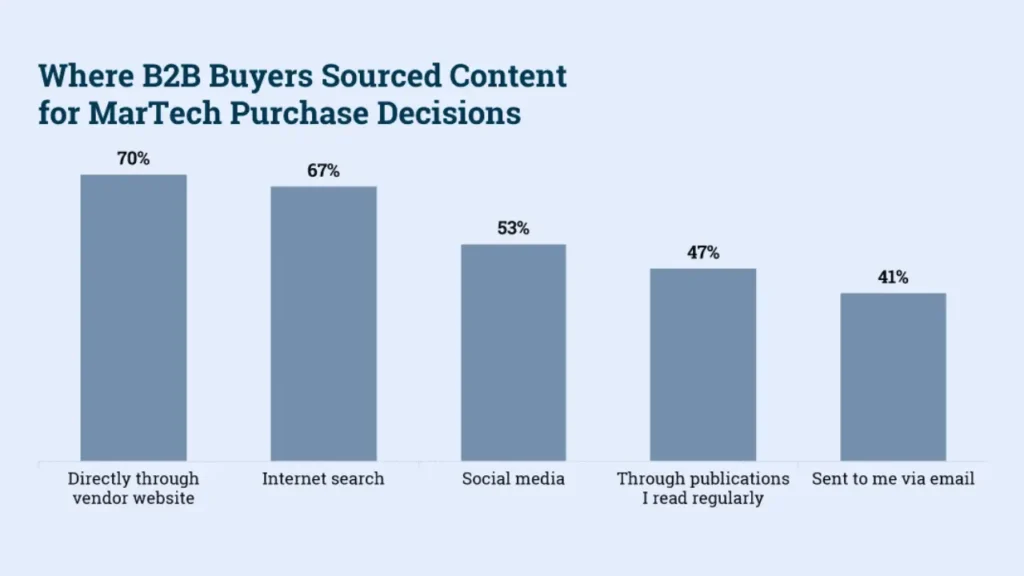
Moreover, B2B buyers, on average, read thirteen pieces of content before making a purchase decision. This shows that a well-rounded content marketing strategy, which provides a mix of valuable and relevant content, can effectively guide prospects through the decision-making process.
As you develop your content, remember to keep it informative, engaging, and focused on addressing the challenges your prospects face.
A striking 80% of decision-makers prefer articles over ads from potential partners. This highlights the value of creating educational, informative content that speaks to your audience’s needs, rather than relying solely on promotional materials.
Providing value and addressing pain points through B2B content marketing is essential for building relationships with your audience and guiding them through the decision-making process.
By focusing on the real-world value of your products or services, offering a diverse range of informative content, and prioritizing articles over ads, you’ll be well on your way to achieving success in the B2B market.
Generate leads
Understanding the role of B2B content marketing in lead generation is essential for any business aiming to thrive in the current marketplace.
American B2B digital ad spend is projected to reach nearly $15 million in 2023. This number isn’t just a testament to the increasing digitization of our world; it’s a sign that businesses are recognizing the power of digital strategies for lead generation. In this context, B2B content marketing is a key component.
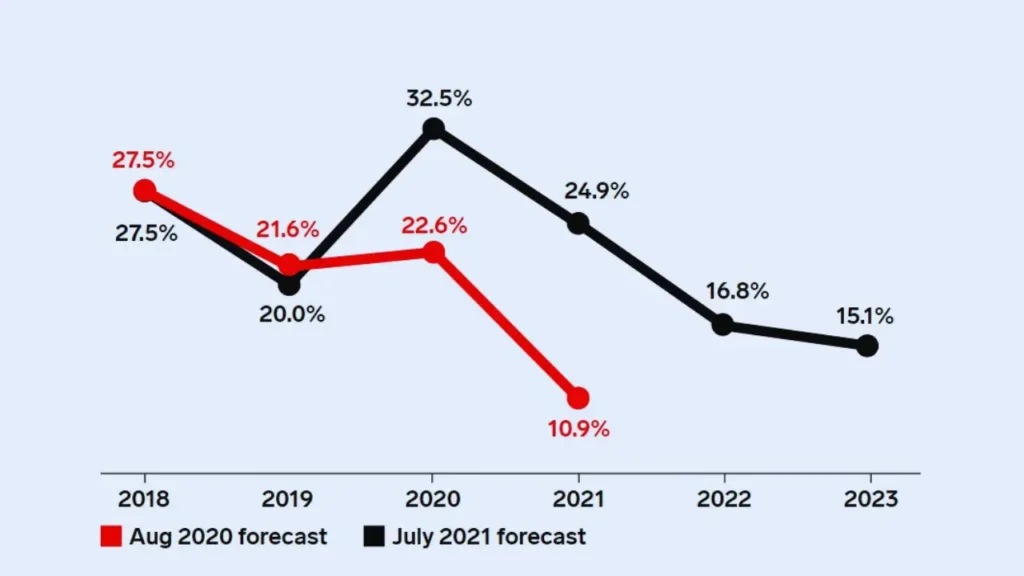
Now, it’s also worth noting that millennials are behind 73% of all B2B buying decisions. This suggests that successful lead generation strategies must take into account the preferences and behaviors of this demographic.
Millennials are known for their affinity for digital platforms, and they value authenticity and engagement. Thus, a robust B2B content marketing strategy that leverages digital platforms, and delivers genuine, interactive content, can be highly effective in attracting this significant portion of the market.
Back in 2021, 46% of marketers said that account-based marketing (ABM) was their preferred B2B strategy. ABM is essentially a personalized approach where marketing and sales efforts are directed towards specific target accounts.
It aligns well with content marketing because, by creating content tailored to these accounts, you can address their unique needs and pain points, making your business solution more appealing. This targeted approach can significantly boost lead generation.
Lastly, let’s not forget about the power of email marketing. According to Sagefrog Marketing Group, it’s the second-best source for driving B2B leads and sales.
In your content marketing strategy, emails can be used to deliver valuable content directly to your prospects. Whether it’s informative blog posts, case studies, or industry updates, sharing content via email can nurture relationships, maintain top-of-mind awareness, and encourage prospects to take the next step in the buying process.
Establish Expertise
On average, B2B buyers consume thirteen pieces of content before making a purchase decision.
Now, imagine if that content was carefully curated, insightful, and demonstrated a deep understanding of the industry, products, and the challenges that buyers face. It’s not hard to see how such content can shape the buyers’ perceptions and influence their purchasing decisions.
By consistently delivering this level of expert content, you’re not just providing information; you’re establishing your business as a trusted authority in your field.
61% of users prefer companies that create custom content. This is a clear signal that today’s consumers appreciate businesses that go beyond generic messaging. They value those who take the time to understand their unique challenges and create tailored content to address those issues. Over time, this can significantly enhance your company’s appeal and credibility.
Research shows that 41% of B2B marketing representatives read three to five pieces of content before engaging with a sales representative. This statistic underscores the crucial role of expert content in the sales process.
By offering comprehensive, insightful, and expert content, you’re essentially paving the way for a smoother, more informed sales conversation. This, in turn, can lead to better customer relationships and potentially, more sales.
So, as you can see, B2B content marketing isn’t just about producing content; it’s about leveraging that content to establish your expertise. And as the statistics indicate, this approach can significantly influence buying decisions, enhance your company’s appeal, and make the sales process more efficient.



